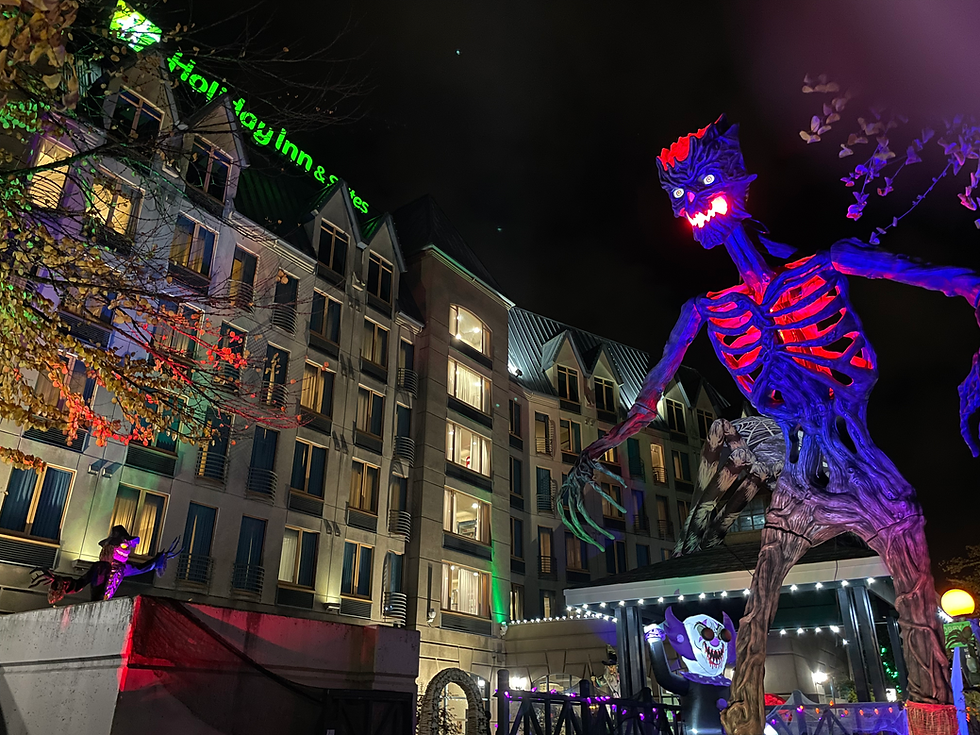Can I Have a Large Dog in an Apartment?
- Joel Harris

- Sep 16, 2022
- 3 min read
Regardless of size, dogs are den animals by nature and, therefore, more adept at living in confined spaces than most people realize. For large dog breeds, in particular, apartment living can actually offer numerous advantages.

Large Dogs Thrive in Any Living Space
Assuming your apartment is of a decent size, and you're not keeping your furry friend cooped up all day long, there's no reason why having a large dog in an apartment should be any different than having a small one. The truth is some breeds are better suited to life in an apartment than others.
For instance, the Greyhound is a gentle giant that's relatively low energy and easily trained. The Great Dane is another large breed that does surprisingly well in small spaces, as long as they get plenty of exercise. Other large breeds known as good apartment dogs include the Mastiff, Bernese Mountain Dog, and St. Bernard.
Different Personalities, Different Needs
It's not just the breed that determines whether a dog will thrive in an apartment – it's also their personality. Some dogs, no matter their size, are simply not cut out for life in close quarters. If your dog is highly active, easily excitable, or prone to excessive barking, an apartment may not be the best fit.
The key is to choose a breed – or better yet, an individual dog – whose personality and needs are compatible with your lifestyle. If you're relatively inactive and live in a quiet neighbourhood, chances are a high-energy breed doesn't work for you, no matter how large or small they are.
But what if you're forced to move into an apartment, and your furry buddy is quite the active pooch? Well, it's your responsibility to adjust accordingly. A successful transition is possible if you do the following:
1 - Give your dog plenty of attention.
Dogs crave companionship and need plenty of time to bond with their companions. If you're gone all day, consider hiring a dog walker or taking your pup to doggy daycare. The last thing you want is Fido to go berserk and start chewing up your furniture or barking incessantly out of boredom and separation anxiety.
Once you get home, find time to cuddle, play, and even take them outside for a short walk. It wonders to a dog's psyche knowing they're not being neglected.
2 - Get them plenty of exercise.
A dog that doesn't get enough exercise is likely to become destructive. If you live in an apartment, this means getting creative with your indoor exercises and being diligent about taking them on regular walks and visits to the dog park.
One way to help an active dog burn off some energy is by playing indoor fetch or tug-of-war. There are a gazillion things you can actually do, and it just takes commitment and creativity.
Tip: If you have never tried food puzzles before, now it's a good time to start. It's an interactive toy that'll engage your dog's brain while they work to get the food out.
3 - Keep them mentally stimulated.
Boredom is often the root cause of behavioural problems in dogs. If your dog is left alone for long periods in a small living space, give them something to do, such as chew toys, treat-dispensing toys, and food puzzles. These things help them keep busy mentally, which in turn helps stave off boredom and destructive behaviour.
It's an issue, especially in an apartment setting, where your four-legged buddy has no yard or outdoor space to explore. Well, the next best thing is mental stimulation. Doing so will help your furry friend stay calm and relaxed even if their mind wants to run wild.
4 - Socialize, socialize, socialize.
This one's a necessity for all dogs but can be especially helpful for those who tend to be anxious or stressed in new environments. Get your pup used to being around people and other animals by enrolling them in puppy classes, dog obedience training, and doggy playdates.
Even if you live in a confined space, the fact that your furry friend has other things to look forward to will help immensely in adjusting.
Tip: If your dog is anxious, try using a pheromone diffuser. It releases calming pheromones that have a relaxing and stress-reducing effect on dogs. It helps your pup remain calm while you try to adjust to apartment life.
Final Thoughts
Yes, you certainly can have a large dog in an apartment.It's a matter of taking the responsibility of getting to know your furry friend's needs and temperament. With a bit of effort, you two will be just fine.





WhatsApp網頁版 WhatsApp網頁版
WhatsApp網頁版 WhatsApp網頁版
WhatsApp網頁版 WhatsApp網頁版
WhatsApp網頁版 WhatsApp網頁版
WhatsApp網頁版 WhatsApp網頁版
WhatsApp網頁版 WhatsApp網頁版
WhatsApp網頁版 WhatsApp網頁版
WhatsApp網頁版 WhatsApp網頁版
WhatsApp網頁版 WhatsApp網頁版
WhatsApp網頁版 WhatsApp網頁版
WhatsApp網頁版 WhatsApp網頁版
WhatsApp網頁版 WhatsApp網頁版
WhatsApp網頁版 WhatsApp網頁版
WhatsApp網頁版 WhatsApp網頁版
WhatsApp網頁版 WhatsApp網頁版
WhatsApp網頁版 WhatsApp網頁版
WhatsApp網頁版 WhatsApp網頁版
WhatsApp網頁版 WhatsApp網頁版
WhatsApp網頁版 WhatsApp網頁版
WhatsApp網頁版 WhatsApp網頁版
WhatsApp網頁版 WhatsApp網頁版
WhatsApp網頁版 WhatsApp網頁版
WhatsApp網頁版 WhatsApp網頁版
WhatsApp網頁版 WhatsApp網頁版
WhatsApp網頁版 WhatsApp網頁版
WhatsApp網頁版 WhatsApp網頁版
WhatsApp網頁版 WhatsApp網頁版
WhatsApp網頁版 WhatsApp網頁版
WhatsApp網頁版 WhatsApp網頁版
WhatsApp網頁版 WhatsApp網頁版
WhatsApp網頁版 WhatsApp網頁版
WhatsApp網頁版 WhatsApp網頁版
WhatsApp網頁版 WhatsApp網頁版
WhatsApp網頁版 WhatsApp網頁版
WhatsApp網頁版 WhatsApp網頁版
WhatsApp網頁版 WhatsApp網頁版
WhatsApp網頁版 WhatsApp網頁版
WhatsApp網頁版 WhatsApp網頁版
WhatsApp網頁版 WhatsApp網頁版
WhatsApp網頁版 WhatsApp網頁版
WhatsApp網頁版 WhatsApp網頁版
WhatsApp網頁版 WhatsApp網頁版
WhatsApp網頁版 WhatsApp網頁版
WhatsApp網頁版 WhatsApp網頁版
WhatsApp網頁版 WhatsApp網頁版
WhatsApp網頁版 WhatsApp網頁版
WhatsApp網頁版 WhatsApp網頁版
WhatsApp網頁版 WhatsApp網頁版
WhatsApp網頁版 WhatsApp網頁版
WhatsApp網頁版 WhatsApp網頁版
WhatsApp網頁版 WhatsApp網頁版
WhatsApp網頁版 WhatsApp網頁版
WhatsApp網頁版 WhatsApp網頁版
WhatsApp網頁版 WhatsApp網頁版
WhatsApp網頁版 WhatsApp網頁版
WhatsApp網頁版 WhatsApp網頁版
WhatsApp網頁版 WhatsApp網頁版
WhatsApp網頁版 WhatsApp網頁版
WhatsApp網頁版 WhatsApp網頁版
WhatsApp網頁版 WhatsApp網頁版
WhatsApp網頁版 WhatsApp網頁版
WhatsApp網頁版 WhatsApp網頁版
WhatsApp網頁版 WhatsApp網頁版
WhatsApp網頁版 WhatsApp網頁版
WhatsApp網頁版 WhatsApp網頁版
WhatsApp網頁版 WhatsApp網頁版
WhatsApp網頁版 WhatsApp網頁版
WhatsApp網頁版 WhatsApp網頁版
WhatsApp網頁版 WhatsApp網頁版
WhatsApp網頁版 WhatsApp網頁版
WhatsApp網頁版 WhatsApp網頁版
WhatsApp網頁版 WhatsApp網頁版
WhatsApp網頁版 WhatsApp網頁版
WhatsApp網頁版 WhatsApp網頁版
WhatsApp網頁版 WhatsApp網頁版
WhatsApp網頁版 WhatsApp網頁版
WhatsApp網頁版 WhatsApp網頁版
WhatsApp網頁版 WhatsApp網頁版
WhatsApp網頁版 WhatsApp網頁版
WhatsApp網頁版 WhatsApp網頁版
WhatsApp網頁版 WhatsApp網頁版
WhatsApp網頁版 WhatsApp網頁版
WhatsApp網頁版 WhatsApp網頁版
WhatsApp網頁版 WhatsApp網頁版
WhatsApp網頁版 WhatsApp網頁版
WhatsApp網頁版 WhatsApp網頁版
WhatsApp網頁版 WhatsApp網頁版
WhatsApp網頁版 WhatsApp網頁版
WhatsApp網頁版 WhatsApp網頁版
WhatsApp網頁版 WhatsApp網頁版